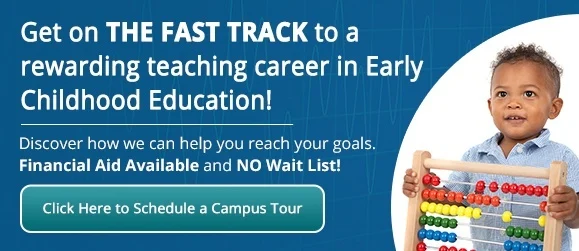Building Resilience in Young Children: Strategies for Emotional Well-Being in Early Childhood Education
Posted On September 6,2023
The process of learning how to become a preschool teacher is more than just learning the best way to teach the alphabet or how to count. It’s more than learning how to facilitate a class full of young children, how to help them develop early literacy, fine motor, and gross motor skills. To make sure that preschool children are set up for academic success, they need to have guidance and instruction in how to manage their own emotions and build resilience. There are several ways to do this through lesson planning and classroom preparation as a preschool teacher.

Develop Emotional Well-Being in Preschool Students
When training to become a preschool teacher, you will learn how to help young students develop basic skills, fine motor skills, gross motor skills, and make sure children are taking basic care of their physical health. But learning how to manage emotions, build resilience, and approach challenges in a healthy way is just as important. Young children are just beginning to learn about their emotions and what they can control, and helping them navigate this new world is an important part of their early childhood education.
Factors That Impact Emotional Well-Being in Young Children
Young children experience stress just like adults. Stressful events can be typical life events or more major shifts. Children worry about going to the doctor, starting a new school, fighting with a friend, having difficulty with a new task or skill, or bigger stressors such as having conflict at home or losing a pet or loved one. Children can get frustrated, and when they don’t know how to manage their frustration and stress, they can manifest those emotions through poor behavior and defiance against rules.
Learn More about Our Early Childhood Education ProgramPreschool Teachers Help Support Emotional Well-Being and Resilience
Children can often feel like they have done something wrong when they are frustrated, stressed, angry, or sad. One of the best things preschool teachers can do for young children to support their emotional well-being is to teach them that their feelings are normal. Teachers can point out how their students are acting and speaking and help them discover which emotions are attached to their actions. Children need to learn that all emotions – even negative ones – are OK, but that doesn’t mean bad behaviors are acceptable. Children can be taught emotional regulation and resilience, and preschool teachers play a big part in helping to facilitate that.
Activities to Help Build Resilience
One of the best activities to help preschoolers build resilience and emotional well-being is teaching students how to recognize and name their emotions. Children benefit from building an emotional vocabulary so they can tell people what is going on and what they need. Knowing how your body might feel and look when you are feeling frustrated, happy, sad, mad, or scared can help them share their feelings accurately.
Preschool children are not too young for mindfulness. There are different books, songs, and videos that can guide children through activities that allow them to focus on their breathing, their bodies, and learn tricks on how to self-regulate themselves. Some of the breathing exercises preschool children can use for mindfulness include belly breathing, rainbow breathing, dragon breathing, and balloon breathing. As preschool children learn to count to 10, they can do that while squeezing a stress ball or tightening and loosening their muscles.
Role playing can help children understand their emotions and emotional reactions. Letting students pretend and act out a situation that is frustrating will help them know how to manage their emotions. You can pretend that a student took a toy, that a friend is having trouble with a new task, or is scared to try a new activity. Students can picture and talk through the potential scenario and learn how to handle it if it becomes a real situation they need to deal with.
There are many books, songs, and movies to help name and manage emotions. During your training to become an early childhood educator, you will begin to develop a list of age-appropriate tools to use. Talking through what a character experienced and how they can use those strategies when they have similar feelings is very helpful.
Games are also a fun way for children to learn resilience. Preschool students can practice running and catching games to improve their gross motor skills, but these will also teach them how to handle a setback, such as a fall, a dropped ball, or not “winning” a game. Mirroring, copying, and games like Simon Says can help students learn to listen to one another. Board games can teach preschool students creative problem solving skills, persistence, and emotional regulation as well.
Become a Preschool Teacher Who Supports Young Children
When you are in a degree program to become a preschool teacher, make sure that your program is giving adequate time to the mental health, emotional well-being, and resilience of preschool children. In addition, your early childhood education program should help you determine when you may need additional help to support your preschool children. If one of your students appears withdrawn, aggressive, anxious, oppositional, or avoidant, you will know when to share your concerns with your director and can begin the conversation with the family. Often, early childhood educators and preschool teachers are among the first to notice when a student’s needs are greater than can be addressed in school, and an early childhood education program that has a focus on recognizing and addressing these concerns is key to the emotional health of your future preschool students.

When you become a preschool teacher, you will quickly learn that it is so much more than a job. You have the opportunity to help young children learn to become better versions of themselves in the world, how to positively interact with each other, and how to manage their own feelings. Learning how to become a preschool teacher means learning how to guide the next generation toward emotional well-being and academic success. If you’ve always felt like you should be a teacher, now is a great time to get started. Athena Career Academy offers an early childhood education degree through a flexible class schedule with caring faculty and staff ready and waiting to help you succeed! To Learn more about how to enroll in our no-wait-list programs, contact us today!